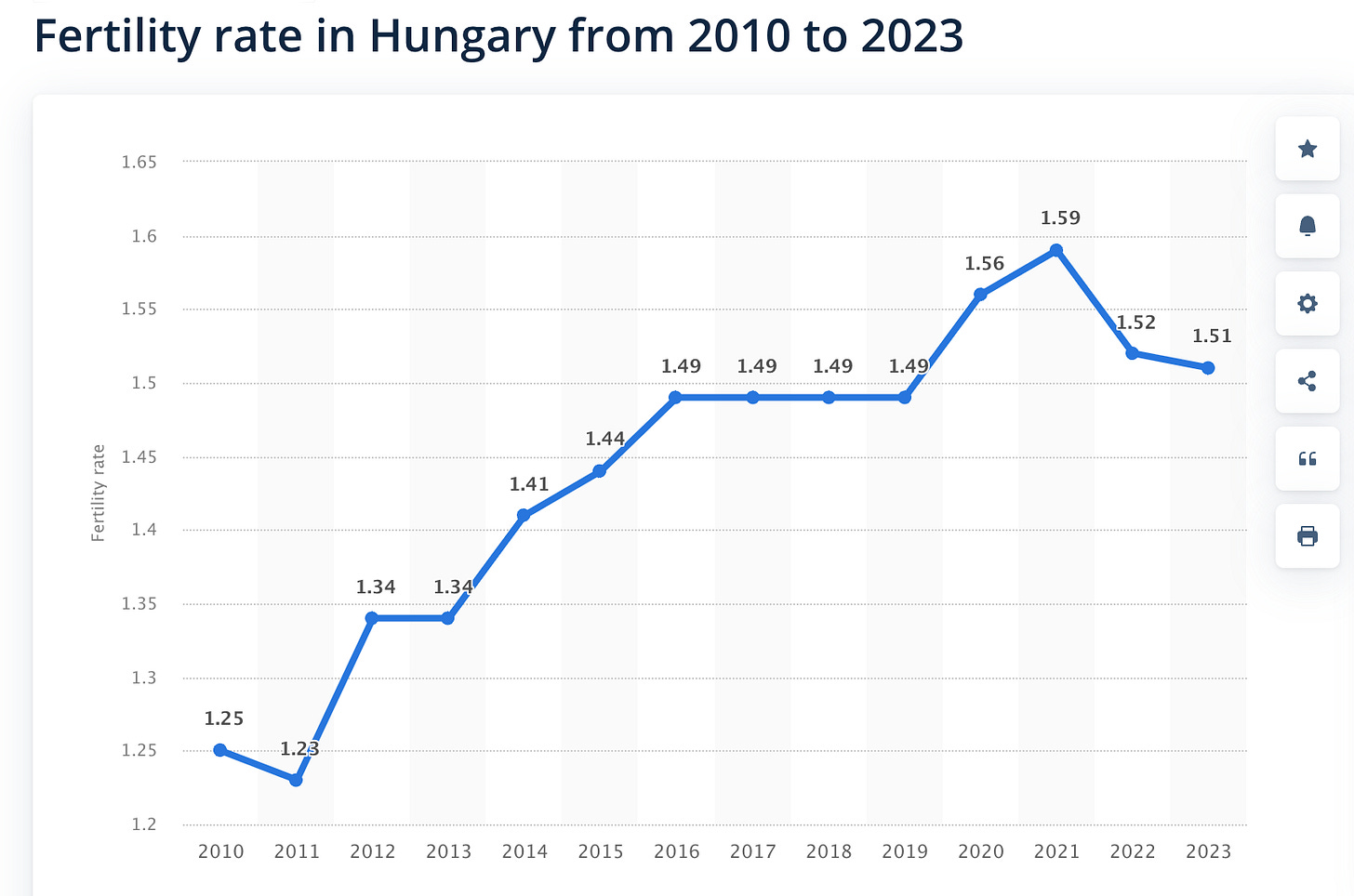How does a political party stay in power for 14 years, and remain intellectually fresh? Budapest diary...
I’m just back from a five-day trip to Budapest, invited by the Hungarian Embassy in London, to travel with a group of journalists to meet all level of Minister, Deputy Minister and State Secretary.
Fidesz, the party of Hungarian Prime Minister Viktor Orbán, has been in power since 2010. How does a political party stay in power this long and remain intellectually fresh? (The British Conservative Party, of course, does not know the answer.)
Having worked in 10 Downing Street 2020–21, I’ve spent more time sitting about the British Cabinet Room table, observing ministers up close, than just about anyone my age or younger.
I have no hesitation in saying, despite one or two exceptions of formidable British intellect, the calibre of Hungary’s ministers and ambassadors is far higher.
What contributes to this difference?
1) A word used by almost every official: “rational”
Hungary’s decision-makers try to look at things rationally. A favourite line of Prime Minister Orbán: “Our best ally is reality.” With the war in Ukraine, and with the election of President Trump, so it is proving.
2) Ministers are pro-books, and pro-reading!
Prime Minister Orbán leading from the front, and this being immediately evident from reading his speeches.
We were told by those we met with of the rapidity with which Orbán (as Prime Minister) insists his direct reports read books that he has just finished. They are intellectuals, as well as politicians.
The Prime Minister has so voracious a desire to know what’s going on that he has moved the geopolitical think tank, the Hungarian Institute of International Affairs, now led by US academic Gladden Pappin, to be plugged into the PM’s office (separate, but complementing the work of the Foreign Ministry).
3) The EU’s “opposition party”
A fascinating observation made by Alexander Mercouris, who was part of the group, that yes, Fidesz has been in power for 14 years. But they are perhaps better thought of as the opposition of the EU Commission – and that’s why Hungary’s leadership has retained its sharpness. They are simultaneously a governing party and an opposition one.
As Churchill knew, any parliament should welcome debate. Fraser Nelson giving a very good 2017 lecture on the architecture of various parliaments and resulting effects:
“Semi-circles are designed to make consensus… As Churchill said, it [a semi-circular parliament] appeals to political theorists, because political theorists like the idea of consensus. But Churchill raised a point against it: consensus of the political class is a very dangerous thing – if that consensus is at odds with a significant chunk of public opinion. Because when that happens, you create a vacancy for populism.”
This is a point Prime Minister Orbán is well aware of:
“I would like to underline the real differences between those politicians who think that European unity means that everybody has to shut up and follow the unity which is defined by somebody – we don’t know exactly who… That’s our attitude. It’s not ‘adversarial’. I think this is the normal attitude.”
Fidesz are anti-consensus – the “rogue” force daring to challenge moribund orthodoxy.
Orbán’s attempts to avert disastrous paths chosen by the EU couldn’t be clearer than with Ukraine. Speaking recently in the European Parliament:
“If we want to win, this current failed strategy must be changed. It is poorly planned and poorly executed. Continuing down this path will only lead to defeat.
If we want Ukraine to avoid such a fate, then we must change our strategy. I strongly urge you [EU leadership] to reconsider your approach.
In every war, diplomatic efforts are essential; there must be communication. Without this, we will only sink deeper into the quagmire of war. The situation will become increasingly desperate, and more and more lives will be lost.
The conflict cannot be resolved on the battlefield. Let us advocate for a ceasefire. Because if we continue on this course, we will all lose.”
The EU today sadly doesn’t welcome debate. But clearly, it needs it.
Hungarian officials made known from their recent trips to Ukraine that life in Kyiv seems relatively normal, but in venturing out to the Ukrainian countryside, towns and villages are near deserted – the eerie implication being: people are being drafted from where it’s quietest. They have put together calculations that Ukraine’s population might have dropped to as low as 27 million (having been estimated at 43 million pre-2022) with the number of people who have fled.
4) Political stability allowing sanity
PM Orbán built Fidesz from scratch, over many years. Founded in 1988, the party won 9% of the vote in its first election in 1990. Over the next twenty years, Orbán managed to unify the right – a lesson for Britain today. István Kiss of the Danube Institute:
“Our right-wing movement was very divided in the 1990s. Of course we needed a strong leader like Orbán, who’s a very talented politician to bring people together. But I think it was also the shock that, if you don’t stick together, the former communists will come back into power – which actually happened.
Four years after the regime change, the former communists (who call themselves socialists) came back with an absolute majority – which I think shocked people.
The first Fidesz government, which began as a coalition government, lost out in a very close election again to a former communist party that sided with the so-called liberals – but who were not actually very liberal.
I think those shocks really convinced people – and you need a good leader as well – to stick together, and come to Fidesz, and have Fidesz as this big tent centre-right party.
In other European states… you have all these different right-wing parties, that don’t understand that you need to be united.
In Hungary, because of our past, we realised that if you don’t stick together… we had the Agrarian Party, more liberal conservatives, more national conservatives, Christian democrats… all of these, except maybe the far right (we still have a far-right party) merged into Fidesz slowly.”
5) Fidesz nurtures young political talent coming through
With scholarships and fellowships in public affairs.
6) Bravery
Hungary has long been strong on border enforcement – many years before it was popular (to put it politely), despite being heavily financially penalised by the EU.
The European Court of Justice has mandated that Hungary pay a €200 million fine for failing to comply with EU asylum regulations. Hungary is also subject to a daily penalty of €1 million unless it aligns its policies with EU laws regarding asylum seekers and migrants (despite other EU countries now enforcing stronger border rules and not being fined as such). Hungary has however allowed in tens of thousands of Ukrainians since 2022 (being a neighbouring country), this adhering to international law.
Increasing the birth rate
In not allowing effectively open borders, the problem of collapsing demographics, affecting all developed countries, is something one quickly has to confront.
Hungary has thus rolled out a suite of policies to try and boost its total fertility rate:
- Loans for young married couples, allowing them to buy a house and receive sizeable deductions in repayments the more kids they have
- Freezing student loan repayments for new mothers
- Other tax breaks (all the way up to income tax abolished for life for mothers of four) that add up to Hungary spending 5% of its GDP on such incentives.
One deputy minister put it: “Some countries put money into immigration; we put it into families.”
Hungary was able to increase its fertility rate from 1.2 to 1.59 over ten years, to 2021:
But the war in Ukraine and increased energy/living costs has not helped the birth rate, and led to a decline since. (Though Hungary now has the highest marriage rate in Europe – something perhaps of a leading indicator of good things to come…)
Elon Musk has been banging the drum of demographic decline for several years, and at a very nerdy (though interesting) conference I attended earlier this year in Berkeley, California, called Manifest, I was struck that this was the most popular topic people were discussing besides AI safety.
The Effective Altruists and Rationalists who run Manifest should next year invite a figure like Hungary’s Deputy Minister Miklos Panyi to discuss policy ideas.
Hungary needs to get to +2.1 total fertility rate and have it stick. That’s incredibly hard. But unlike almost any other country suffering today from population collapse, it’s actually trying. And its spending demonstrates its determination and seriousness.
Are there downsides? Sure.
[*] Critics would argue Hungary is dependent on Russia for energy (LNG and nuclear power).
But it’s a long-standing default that Hungary’s nuclear power comes from Russia. And it’s preferable that Hungary is (unlike notable other European countries) pro-nuclear energy; just shy of 50% of Hungary’s electricity in 2023 having come from nuclear power.
And for a country with few natural resources itself, does it not make sense to have energy trade with a near neighbour? Importing American LNG is both more expensive and causes all kinds of ecological damage.
[*] Perhaps more reason for Western concern: the amount of Chinese investment going into Hungary. According to Bismarck Analysis, Hungary rocketed from 1% of Chinese investment in Europe in 2021 to 44% in 2023, and it’s arguably emulating the Cameron/Osborne playbook.
A couple of (non-government) Hungarians pointed out to me their discomfort in the government growing so close to China, allowing in Huawei, and the extent of China’s foreign direct investment.
But Hungary is a +2% paying member of NATO – which still can’t be said for other leading NATO countries who have cozied up to potential adversaries to help their economy.
[*] There are accusations of corruption – as there are of many countries.
[*] Though it has produced a couple of Unicorns, Hungary hasn’t yet had any major breakout startups. It could arguably be more ambitious on nuclear energy, as well as (an idea put forward by one of the group) allow the likes of Microsoft to come in and finance the building of data centres to stay relevant with coming AI advancements.
In our group raising these kinds of questions and concerns, the government figures we met demonstrated their seriousness – and that they are earnestly trying to improve the country’s standing. One group member (who works as a defence analyst) was awed by the technical expertise of Hungary’s Ambassador in London, Ferenc Kumin.
*
Proof of Hungary’s democracy working is that Fidesz are genuinely concerned about the opposition leader they’ll be up against (with accompanying EU endorsement) in 2026.
But hopefully seeing him off, Prime Minister Orbán, age 61, could well govern for a long time yet – and he’ll have no shortage of candidates for successor when he does one day step down. Evidenced from this trip, Fidesz has a deep bench of talent.
Hungary’s parliament is strikingly beautiful:
Can Westminster Hall hold a candle to?
Rather than dismiss Orbán as “fascist” and “far right”, Brits would do well to learn from the recent experience of Trump’s win, ignore most legacy media, look with their own eyes, and realise how much there is for Britain to learn from.
Go and take a trip to Budapest to see yourself!
PS. In September I wrote a piece here entitled, “Is the British political class really this dumb?” (to fire our own long-range missiles into Russia). The answer is of course now a resounding yes.
Despite the majority of Ukrainians wanting peace talks, and a US President-elect who is committed to peace taking office in 57 days, the British government thinks it a good idea to further alienate the forthcoming leader of their closest ally – despite there being little-to-no military upside.
President Biden has proven himself unable to find his way into a G20 photo. Is this really the moment we want to provoke the world’s largest nuclear power?
I wrote in September: “The person seemingly preventing all this from actually happening, to his great credit, is President Biden. If Trump wins, on foreign policy Starmer and the British establishment will have to wise up. But Biden is a far surer hand on this than Harris.” I was wrong – and gave more credit to both Biden and Starmer than I should have.
We are firing British missiles into Russia – and the only prominent figure in British parliament publicly saying that this is unwise seems to be Nigel Farage.
These long-range missiles are primarily trying to defend Kursk. We are inviting unprecedented hypersonic missile strikes to try and defend Russian territory.
Germany has been smart enough thus far not to follow.
Western missiles will not change the outcome in any favourable way. It will surely bring about Russian escalation in other theatres – as well as confirm in Putin’s mind that we are the enemy. Diplomacy cannot come soon enough.











Congratulations on your correct and unbiased writing ! We Hungarians will never be understood in the West, because we ourselves consider ourselves a rebellious nation, our long bloody history has threatened the nation with complete annihilation from time to time, and we have also learned that in the decisive moments when we had to confront the powers attacking from the East, the West watched our battles with folded arms and grinned. That is why we will never trust the West.
My father was one of the fighters of the 1956 revolution, we had already lost the fight against the Soviet Union's armored vehicles, who were wading in the blood of young university students in Budapest, but the CIA-run Radio Free Europe propagandist shouted and encouraged us to fight a hopeless battle, exactly the same way as the unfortunate Ukrainian youth are encouraged to defend the Black Rock's land !
As you know, we are proud to have given the world a far greater proportion of Nobel Prize-winning scientists than the country has, our participation contributed to the success of the US nuclear program, as Edward Teller (born Ede Teller in Hungary) did to the creation of the Hydrogen bomb, and as you have experienced, we love to read and learn.
We know your history, and perhaps that is why we have adapted the words of the former Lord Palmerston to our country: "England has no permanent friends, England has no permanent enemies, England has interests !", well, we will apply this to Hungary !
Good argument.